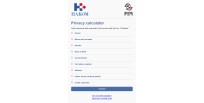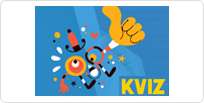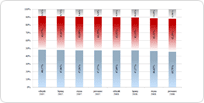Hakom - Croatian Post and Electronic Communications Agency
e-Agency
Users:
Cost Estimator
The Holder of Framework Programme
GIS portal
Privacy calculator
Application ''Quiz''
Market survey
HAKOM and FER held a second Conference on the Topic "People with Disabilities in the Digital Society"
PRESS RELEASSEEnsuring the preconditions and the activities aimed at inclusion and promotion of persons with disabilities in digital society are of utmost importance while operators, regulatory bodies and associations will jointly work on it in the forthcoming period.
ZAGREB, 29 November 2018 - The Croatian Regulatory Authority for Network Industries (HAKOM) and the Faculty of Electrical Engineering and Computing at the University of Zagreb (FER) held a second conference on topic "People with Disabilities in Digital Society", which brought together representatives of associations of persons with disabilities, as well as representatives of operators, state institutions, civil associations and the academic community. The aim of the meeting was to give an overview of the position of people with disabilities as the users of electronic communications services and to provide guidelines for further improvements, as well as to present the changes that occurred referring the previous conference.
"People with Disabilities in the Digital Society" was the topic of HAKOM's presentation by Ivo Majerski, Head of Information and Protection Department. In reference to conclusions from the previous conference and the progresses made in relation to the earlier period. The emphasis was put on important conclusions, the necessity for increased access to price information and performance of exposed (mobile) devices at the operator's point of sale, as well as the implementation of ringtones for assistance at a difficult access point. In addition the accent was put on the necessity to define the communication model of the operator with a sign language interpreter that could be applied by individual operator as well and appointing an individual for communication and inquiries related to persons with disabilities by the operator. According to operator reports, some of the conclusions have been implemented successfully, and the smaller part is in the process of realization.
The presentation on the topic of "Disability Inclusion" was held by Gordana Glibo, a representative of the UP2date Association, dealing w with disabilities, blind people, deaf, and hard of hearing persons with various bodily injuries. In his presentation, it was emphasized that today's digital revolution provides equal opportunity for people with disabilities in all spheres of life, and as the most important feature of the spectrum of opportunities, he emphasized equality in education along with competitiveness in the labour market. In order to use all the digital information in its best form, it is essential that web design conforms to basic accessibility standards (universal design).
The prototype of the accessible web site was presented by the representatives from FER Matea Žilak, Lucija Jakšić and Ilir Murati, and representatives of operators and regulator having participated in the discussion.
# # #
For additional information please contact:
Croatian Regulatory Authority for Network Industries (HAKOM)
Roberta Frangeša Mihanovića 9
10110 Zagreb, Croatia
Tel. + 385 (0) 1 700 70 07
Fax + 385 (0)1 700 70 70
Media inquiries can be submitted online using HAKOM’s official website:
Registration required.
ABOUT HAKOM: HAKOM (www.hakom.hr) - Croatian Regulatory Authority for Network Industries – ensures preconditions for a fair market competition, stable growth and environment for innovations in the electronic communications and postal services market. HAKOM protects users’ interests and the possibility of choice among various communications and postal services at affordable prices, defines sustainable competitive conditions for operators and service providers under fair conditions for return on investment, and provides support to economic growth, public services and the quality of life in the Republic of Croatia by using modern technologies. HAKOM’ strategic goals are: to promote regulation of the electronic communications and postal services market, to support growth of investments and innovations in the electronic communications and postal services market, to provide efficient use of limited resources, to accelerate the growth of broadband products and services, to provide affordable offers of communications and postal services, to provide protection and informing of users, to build an efficient and comprehensive information system, to define and implement efficient processes, and to acquire multi-disciplinary competencies in market regulation.
"People with Disabilities in the Digital Society" was the topic of HAKOM's presentation by Ivo Majerski, Head of Information and Protection Department. In reference to conclusions from the previous conference and the progresses made in relation to the earlier period. The emphasis was put on important conclusions, the necessity for increased access to price information and performance of exposed (mobile) devices at the operator's point of sale, as well as the implementation of ringtones for assistance at a difficult access point. In addition the accent was put on the necessity to define the communication model of the operator with a sign language interpreter that could be applied by individual operator as well and appointing an individual for communication and inquiries related to persons with disabilities by the operator. According to operator reports, some of the conclusions have been implemented successfully, and the smaller part is in the process of realization.
The presentation on the topic of "Disability Inclusion" was held by Gordana Glibo, a representative of the UP2date Association, dealing w with disabilities, blind people, deaf, and hard of hearing persons with various bodily injuries. In his presentation, it was emphasized that today's digital revolution provides equal opportunity for people with disabilities in all spheres of life, and as the most important feature of the spectrum of opportunities, he emphasized equality in education along with competitiveness in the labour market. In order to use all the digital information in its best form, it is essential that web design conforms to basic accessibility standards (universal design).
The prototype of the accessible web site was presented by the representatives from FER Matea Žilak, Lucija Jakšić and Ilir Murati, and representatives of operators and regulator having participated in the discussion.
# # #
For additional information please contact:
Croatian Regulatory Authority for Network Industries (HAKOM)
Roberta Frangeša Mihanovića 9
10110 Zagreb, Croatia
Tel. + 385 (0) 1 700 70 07
Fax + 385 (0)1 700 70 70
Media inquiries can be submitted online using HAKOM’s official website:
Registration required.
ABOUT HAKOM: HAKOM (www.hakom.hr) - Croatian Regulatory Authority for Network Industries – ensures preconditions for a fair market competition, stable growth and environment for innovations in the electronic communications and postal services market. HAKOM protects users’ interests and the possibility of choice among various communications and postal services at affordable prices, defines sustainable competitive conditions for operators and service providers under fair conditions for return on investment, and provides support to economic growth, public services and the quality of life in the Republic of Croatia by using modern technologies. HAKOM’ strategic goals are: to promote regulation of the electronic communications and postal services market, to support growth of investments and innovations in the electronic communications and postal services market, to provide efficient use of limited resources, to accelerate the growth of broadband products and services, to provide affordable offers of communications and postal services, to provide protection and informing of users, to build an efficient and comprehensive information system, to define and implement efficient processes, and to acquire multi-disciplinary competencies in market regulation.















